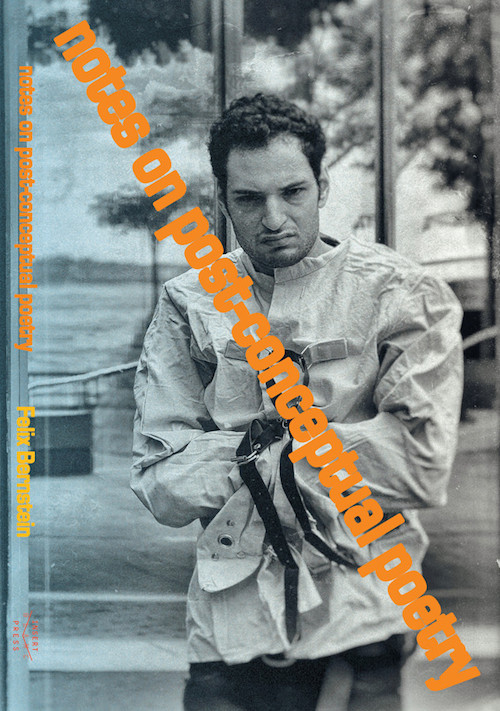Felix Bernstein's Notes on Post-Conceptual Poetry Reviewed at LARB

If you're curious what Felix Bernstein's debut essay collection, Notes on Post-Conceptual Poetry (Insert Blanc Press), is all about, just click over to the Los Angeles Review of Books to find out. Cassandra Seltman takes on a tour of the book, noting:
Born in 1992, Bernstein swerves in and out of the scenes he discusses, the millennial conditions he diagnoses, and the “new sincerity” he critiques. His own self-suspicion flippantly resists the notion of network building that his father, Charles Bernstein, so neatly perfected with his original publication of the journal L=A=N=G=U=A=G=E in the 1970s (and then later with his institutional curatorial projects — the Electronic Poetry Center and PennSound). His attitude puts him at odds with some of his peers. Bernstein takes to task those urbane poets who, in his view, attempt to update the New York School and pledge allegiance to coterie and art in the name of queerness and subversion. Yet he self-consciously makes these same moves himself.
Seltman remarks on the engine of the book being one of antagonism, but one complicated by Bernstein's "product placements":
Bernstein returns most often to critics who disparage an art, or a style, or a coterie — only to surreptitiously praise some exceptional practitioner of that technique. He points to Keith J. Varadi, who “drags the major trends of post-conceptualism through the dirt only to grace a few poets, namely Andrew Durbin, as doing it better, or more worth our time.” Lauren Cornell and Ed Halter are called out for using the same sort of bait-and-switch with post-internet art. And then, in the negation of the negation, Bernstein lets us know that he has performed the very same moves in his book, and dares the reader to find them, which isn’t very hard. (He clearly plays favorites with Trisha Low, Lonely Christopher, and Cecilia Corrigan.) The redemptive aspect of Bernstein’s seeming hypocrisy is his transparency. He lays bare a true and tired formula through which practices at the “margins” of art appear more authentic and interesting than “boring” dominant art, until marginal art is brought back into the fold. “If you can start to get used to this formula, then you’re on your way to being an art world critic,” he advises.
Despite all the scuffles Notes has caused, one wonders if this book inevitably serves as a manifesto for Bernstein’s friends and family. Does it serve, for instance, the 89 Plus Foundation (Hans Ulrich Obrist’s collection of artists and poets born after 1989 including Durbin, Trisha Low, Steve Roggenbuck, Amalia Ulman, and Sophia Le Fraga) as an all-press-is-good-press advertisement? At the book’s New York launch, Low joked that Bernstein made its poets into straw men, but isn’t the straw man just a way of priming for the canon? Despite his literary “acting out,” perhaps Bernstein wants to sit at the post-internet lunch table.
Notes is, to use Bernstein’s own words, “chock full of product placements,” even if he chastises Durbin’s art for this:
In general, the Frank O’Hara 2.0 style does make for entertaining poetry but it is hard to call it innovative — which makes the praise from art world heavyweights like [Hans Ulrich] Obrist or Stuart Comer seem to be more about the fact that the references are more contemporary than anything else. And maybe this is Durbin’s greatest cunning: the book is chock full of product placements.
Durbin “gets it” too. Is Bernstein merely critiquing his own desires, like a jealous brother competing for institutional attention? His cranky awareness of the sometimes financial nature of relationships between poets (and between poets and their families) counter-intuitively redeems his criticism. His transparency, his openly excessive, privileged middle-class traumas, and his reference-crazed obsessions are not the same as the post-internet works he takes to task. However much they might be related.
Read on at LARB.


